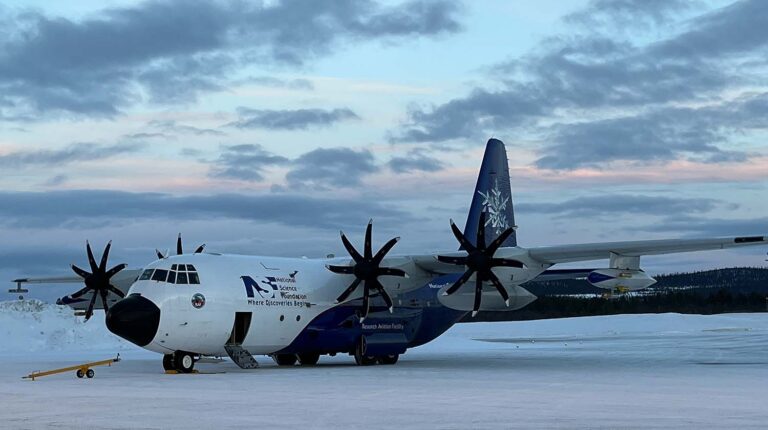The US National Science Foundation National Center for Atmospheric Research (NSF NCAR) has launched the Cold Air Outbreak Experiment in the Sub-Arctic Region (CAESAR) field campaign, which will see researchers fly into the Arctic to study marine cold air outbreaks (CAOs).
From February 22 to April 7, the researchers will travel to Kiruna, Sweden’s northernmost city, for the field campaign. CAESAR is co-organized by the US NSF NCAR; a collaboration of scientists, students and staff from eight US universities; Stockholm University in Sweden; the University of Oslo in Norway; and the US Naval Research Laboratory.
The main role of NSF NCAR staff and scientists is to support operations. Cory Wolff, the NSF NCAR project manager who is overseeing CAESAR operations, said, “Our main criterion was finding an airplane hangar that was large enough for the C-130 and also close enough to the ocean that we wouldn’t spend too much time ferrying over land.”
CAESAR will use a suite of radar, lidar and radiometry instrumentation not previously deployed to the Arctic. NSF NCAR’s C-130, a military transportation aircraft that has been transformed into a flying laboratory with an array of in situ and remote sensors, provides a platform to study the cloud formation that occurs over Arctic open waters. The CAESAR team will be able to make one eight- to nine-hour flight per day, with the C-130 capable of reaching the Arctic sea ice edge. The airplane will employ a variety of instruments to collect data from above, beneath and inside CAOs.
Dropsondes will provide in situ data about the wind, temperature and humidity as they travel vertically through the atmosphere. Two lidars and two radars will be used on the C-130 to determine the proportions of ice and water as the airplane flies above and beneath the clouds by vertically profiling moisture airborne particles as well as determining updrafts and downdrafts. Instruments on the wings will sample cloud properties, and air intakes will bring airborne particles, or aerosols, into the cabin for analysis. All of this data is intended to help the team create a comprehensive view of how atmospheric conditions affect CAOs.
“The challenge with these clouds in models is that they occur at fine scales and only a coarse representation of them currently exists in climate models,” said Bart Geerts, a professor of atmospheric science at the University of Wyoming and a CAESAR principal investigator.
To maximize the value of the data collected, climate modelers from NSF NCAR and other institutions will join the research team in the field as collaborators. The CAESAR team hopes that its observations will help refine the modeling of the Arctic and better represent the circulation and precipitation of CAOs.
“All field campaigns require some level of flexibility because of the unpredictability of the natural environment, but when you go to remote places to study weather, you will always learn something,” Wolff said.
The scientists hope that CAESAR will allow them to understand more about the role CAOs and the clouds they generate are playing in the rapid warming of the Arctic.
“The Arctic is changing rapidly, warming at a rate two to four times faster than the global average,” said Paquita Zuidema, a professor of atmospheric sciences at the University of Miami and a CAESAR principal investigator. “A consensus on why and how this is occurring is still lacking, and the role of clouds is uncertain. The more we can learn about Arctic cloud behavior now, the better we can predict the Arctic of the future.”
The researchers point out that because of the low air temperatures, the clouds formed by CAOs are mixed phase, meaning they are a mixture of droplets and ice crystals. In general, mixed-phase cloud conditions are harder to characterize with instruments, and harder to simulate, than liquid- or ice-only clouds. According to the team, the marine CAO cloud regime is well recognized in satellite imagery but surprisingly little is known about how these clouds form and evolve.
Arctic weather, including CAOs, can reportedly affect larger-scale weather around the world by influencing how much moisture and heat is transported toward and away from the equator. Despite this impact, cold air outbreaks in the subarctic region have only recently been the subject of study, largely because of the challenging logistics that come with the remote location. The data collected from CAESAR is therefore expected to support improved climate modeling and weather forecasting of the Arctic.
“These subjectively beautiful clouds serve as a natural lab to study cloud dynamics at a wide range of scales,” said Geerts.
The field campaign also includes educational opportunities. While in Kiruna, CAESAR will engage in several community outreach projects, including an open house organized by NSF NCAR’s Education, Engagement and Early Career Development office and guest lectures by the CAESAR team that will also be virtual and recorded to extend their use. Several graduate students are also part of the team and will have the opportunity to extend their learning beyond textbooks.
For more key polar weather updates from the meteorological technology industry, click here.



